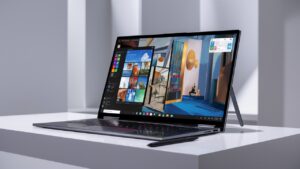Solar fridge technology is a game-changer for off-grid living. It offers reliable cooling powered by the sun.
Imagine having a fridge that runs without electricity. Solar fridges do just that. They use solar panels to convert sunlight into energy. This is perfect for remote areas and eco-friendly homes. Solar fridges reduce reliance on traditional power. They are cost-effective and sustainable.
Plus, they help cut down on carbon footprints. In this blog post, we will explore the technology behind solar fridges. We will also discuss their benefits. Stay with us to learn how this innovative solution can improve your life.
Introduction To Solar Fridges
Solar fridges are a great way to store food and medicines. These fridges use solar energy to keep things cold. They are perfect for places without a steady power supply. By using solar energy, they help reduce electricity bills. Let’s dive deeper into what solar fridges are and their history.
What Are Solar Fridges?
Solar fridges are powered by the sun. They use solar panels to collect sunlight. The collected energy is then converted into electricity. This electricity powers the fridge. Solar fridges work even when the sun is not shining. They have batteries to store extra energy. This stored energy keeps the fridge running at night or on cloudy days.
Brief History
The idea of using solar power for refrigeration is not new. It started gaining attention in the 20th century. Early models were basic and less efficient. Over the years, technology improved. Modern solar fridges are more efficient and reliable. They are now widely used in remote areas. These fridges have become essential for storing vaccines in developing countries.
How Solar Fridges Work
Solar fridge technology uses solar panels to generate electricity, powering the fridge efficiently. This helps in areas with unreliable electricity, keeping food fresh and safe.
Solar fridges are an innovative solution that combines sustainability with practicality. They are perfect for areas with limited access to electricity. Understanding how solar fridges work can help you appreciate their benefits even more.
Basic Mechanism
Solar fridges use solar panels to harness energy from the sun. This energy is then converted into electricity, which powers the fridge. The process is simple and efficient.
During the day, solar panels absorb sunlight. They convert it into direct current (DC) electricity. This electricity is stored in a battery or used immediately to power the fridge.
At night or on cloudy days, the stored energy in the battery keeps the fridge running. This ensures your food stays fresh around the clock.
Key Components
The key components of a solar fridge include solar panels, a battery, a charge controller, and the fridge itself. Each part plays a crucial role.
Solar Panels: They capture sunlight and convert it into electricity. The size and efficiency of the panels determine how much energy is produced.
Battery: It stores the energy generated by the solar panels. This stored energy powers the fridge when there is no sunlight.
Charge Controller: It regulates the flow of electricity from the solar panels to the battery. This prevents overcharging and extends the battery’s life.
Fridge: The fridge is specially designed to operate efficiently on low power. It uses advanced insulation and compressor technology to keep your food cold with minimal energy.
Consider how much easier your life could be with a solar fridge. You wouldn’t need to worry about power outages or high electricity bills.
What would you store in your solar fridge? Fresh vegetables? Cold drinks? The possibilities are endless.
Types Of Solar Fridges
Solar fridge technology includes direct-drive and battery-powered models. Direct-drive fridges use solar panels without batteries. Battery-powered fridges store energy for cloudy days.
Solar fridge technology has come a long way in recent years, offering environmentally friendly and cost-effective solutions for keeping food and beverages cool. These fridges use solar energy to operate, making them ideal for areas with limited access to electricity. In this section, we’ll explore the different types of solar fridges available, each with its unique benefits and features.
Direct Current (dc) Fridges
DC fridges are specifically designed to run on direct current electricity generated by solar panels. They are highly efficient and consume less power compared to traditional fridges.
For example, you can use a small solar panel system to power a DC fridge, which can be a great solution for off-grid living or remote locations. These fridges often come with features like adjustable thermostats and low voltage protection, ensuring your food stays fresh without draining your solar power resources.
If you’re considering a solar fridge for your home, think about the long-term savings on your electricity bill. Wouldn’t it be nice to reduce your reliance on the grid while keeping your groceries cool?
Absorption Fridges
Absorption fridges use a heat source, such as solar energy, to create a cooling effect through a chemical process. These fridges are incredibly versatile because they can run on various heat sources, including propane, natural gas, and solar energy.
Imagine you’re camping in a remote area with no access to electricity. An absorption fridge can be a lifesaver, keeping your food and drinks cold using the sun’s heat. This type of fridge is also quieter than compressor-based models, making it perfect for peaceful environments.
Have you ever thought about the convenience of having a fridge that can work on multiple energy sources? It adds flexibility and ensures you always have a way to keep your perishables fresh.
Both DC and absorption fridges offer unique advantages depending on your specific needs and circumstances. By understanding these options, you can make a more informed decision that aligns with your lifestyle and environmental goals.
What type of solar fridge do you think would suit your needs best?
Energy Efficiency Benefits
Solar fridge technology offers numerous benefits. One of the main advantages is energy efficiency. This makes solar fridges an attractive choice for many households and businesses. They help save energy, reduce costs, and lessen environmental impact.
Lower Energy Consumption
Solar fridges consume less energy. They use solar power, which is a renewable resource. This means they do not rely on traditional electricity. As a result, they lower your energy bills. They also help conserve energy resources.
Reduced Carbon Footprint
Solar fridges contribute to a smaller carbon footprint. Traditional fridges use fossil fuels. These release harmful emissions into the atmosphere. Solar fridges, on the other hand, harness the sun’s power. This leads to fewer emissions. So, you help protect the environment. Choosing a solar fridge is a step towards greener living.
Cost-effectiveness
Solar fridge technology offers a cost-effective solution for preserving food and medicine. It harnesses solar energy, reducing electricity bills and ensuring reliable cooling in remote areas.
Switching to solar fridge technology can make a big difference in your budget. It might seem like a large investment at first, but the long-term savings can be significant. Let’s break down the cost-effectiveness of solar fridges.
Initial Investment
The initial cost of a solar fridge can be higher than a conventional fridge. You need to factor in the price of solar panels and batteries. However, these costs are a one-time expense.
Think of it as an investment in your future. You might need to stretch your budget initially, but the benefits are worth it.
Long-Term Savings
Over time, a solar fridge pays for itself. Imagine not worrying about your electricity bill every month. This is especially true if you live in a sunny area.
Solar fridges also have fewer moving parts, which means less maintenance. This can save you money on repairs and replacements.
Consider this: a traditional fridge adds to your power bill each month. A solar fridge, on the other hand, uses the sun—a free energy source.
Have you ever calculated how much you spend on electricity in a year? Switching to solar can cut those costs dramatically.
By making the switch, you contribute to a greener planet while also saving money. It’s a win-win situation for both you and the environment.
Isn’t it time you thought about where your money is going? Investing in a solar fridge could be one of the smartest financial decisions you make.
Applications Of Solar Fridges
Solar fridge technology helps store medicines in remote areas. These fridges use solar power, making them eco-friendly. Ideal for places without electricity.
Solar fridge technology has a wide range of applications. These fridges are powered by solar energy. They offer a sustainable and eco-friendly solution. They are useful in homes, businesses, and industries. Let’s explore their different uses.
Residential Use
Solar fridges are perfect for homes. They keep food fresh without relying on electricity. They are great for off-grid living. They reduce energy bills. They provide a reliable cooling solution during power outages. They are safe and easy to use.
Commercial And Industrial Use
Businesses benefit from solar fridges. Restaurants, cafes, and grocery stores use them. They save money on energy costs. They ensure food safety. They are ideal for remote locations. Industries use them for cooling sensitive products. They are efficient and durable.
Solar fridges are versatile. They are useful in various settings. They provide a green alternative to traditional fridges. They support sustainability efforts. They are a smart choice for many applications.
“`
Challenges And Limitations
Solar fridge technology faces challenges like high initial costs and limited efficiency in cloudy regions. Maintenance can also be difficult in remote areas.
Solar fridge technology is an innovative solution for off-grid and remote locations. Despite its many benefits, it also comes with a set of challenges and limitations that you should be aware of. Understanding these can help you make an informed decision on whether this technology is right for you.
Weather Dependence
Solar fridges rely heavily on sunlight to function efficiently. In regions with inconsistent sunlight, such as during winter or in cloudy climates, the performance of the fridge can be compromised.
Imagine planning a camping trip and counting on your solar fridge, only to find out it’s not keeping your food cold because of overcast skies. That can be frustrating!
This weather dependence means you might need a backup power source or additional solar panels, which could add to the complexity and cost of your setup.
Initial Costs
The upfront cost of solar fridge technology can be higher than traditional fridges. Solar panels, batteries, and the fridge itself are significant investments.
For a family on a budget, this initial expense might seem daunting. However, consider the long-term savings on electricity bills and the convenience of having a reliable fridge in remote areas.
Yet, it’s essential to weigh these initial costs against your specific needs and circumstances. Do you need the fridge for occasional use or as a permanent fixture in your off-grid home?
In conclusion, while solar fridge technology offers many advantages, it’s important to consider these challenges and limitations. Are you prepared for the weather dependence and initial costs? If so, a solar fridge could be a game-changer for your off-grid adventures.
Future Of Solar Fridge Technology
Solar fridge technology offers efficient cooling using solar power. It reduces energy bills and supports eco-friendly living. This technology ensures sustainable refrigeration, especially in remote areas without electricity.
The future of solar fridge technology is bright and full of promise. As the world moves towards cleaner and more sustainable energy solutions, solar-powered appliances are gaining traction. Solar fridges, in particular, offer an eco-friendly alternative to traditional refrigeration, especially in off-grid and remote areas.
Innovations On The Horizon
Cutting-edge advancements in solar fridge technology are on the horizon. Emerging designs focus on increasing efficiency and reducing energy consumption. Imagine a fridge that maintains a consistent temperature with minimal solar input, even during cloudy days.
New materials and insulation techniques are being tested. These could significantly enhance the performance and longevity of solar fridges. Think about how this could transform food storage in areas with unreliable electricity.
Smart technology integration is another exciting development. Picture a solar fridge that connects to your smartphone, allowing you to monitor and adjust settings remotely. This could revolutionize how you manage your food storage, ensuring optimal conditions at all times.
Potential Market Growth
The market for solar fridges is poised for significant growth. As the demand for sustainable living solutions increases, so does interest in solar-powered appliances. Have you ever considered how much energy you could save by switching to a solar fridge?
Developing countries stand to benefit immensely. Many rural areas lack reliable electricity, making solar fridges a game-changer. Imagine the impact on healthcare facilities that can now store vaccines and medicines safely.
In urban settings, eco-conscious consumers are driving demand. More people are looking to reduce their carbon footprint. A solar fridge not only helps the environment but can also lower your energy bills.
The future of solar fridge technology is not just about innovation. It’s about making a tangible difference in everyday lives. Wouldn’t you want to be part of that change?

Frequently Asked Questions
How Does A Solar Refrigerator Work?
A solar refrigerator uses solar panels to convert sunlight into electricity. This electricity powers the fridge, keeping food cold and fresh. Solar energy is stored in batteries for use during cloudy days or nighttime. This eco-friendly solution reduces reliance on traditional power sources.
What Are The Benefits Of A Fridge?
A fridge preserves food by keeping it cool, extending freshness. It prevents spoilage, reduces waste, and stores perishable items.
What Are The Benefits Of Using A Solar Hybrid Refrigerator?
Using a solar hybrid refrigerator reduces electricity bills, promotes eco-friendliness, and provides reliable cooling during power outages.
What Are The Disadvantages Of Solar Refrigerators?
Solar refrigerators can be expensive to purchase and install. They require consistent sunlight, which may not be available everywhere. Maintenance and repairs can be costly. Limited storage capacity compared to traditional models can be a drawback.
Conclusion
Solar fridge technology offers numerous benefits. It provides reliable cooling. It reduces energy costs. Ideal for remote areas. Helps preserve food and medicine. Environmentally friendly. Easy to maintain. Solar fridges support a sustainable future. They are a smart choice. Consider investing in one today.








